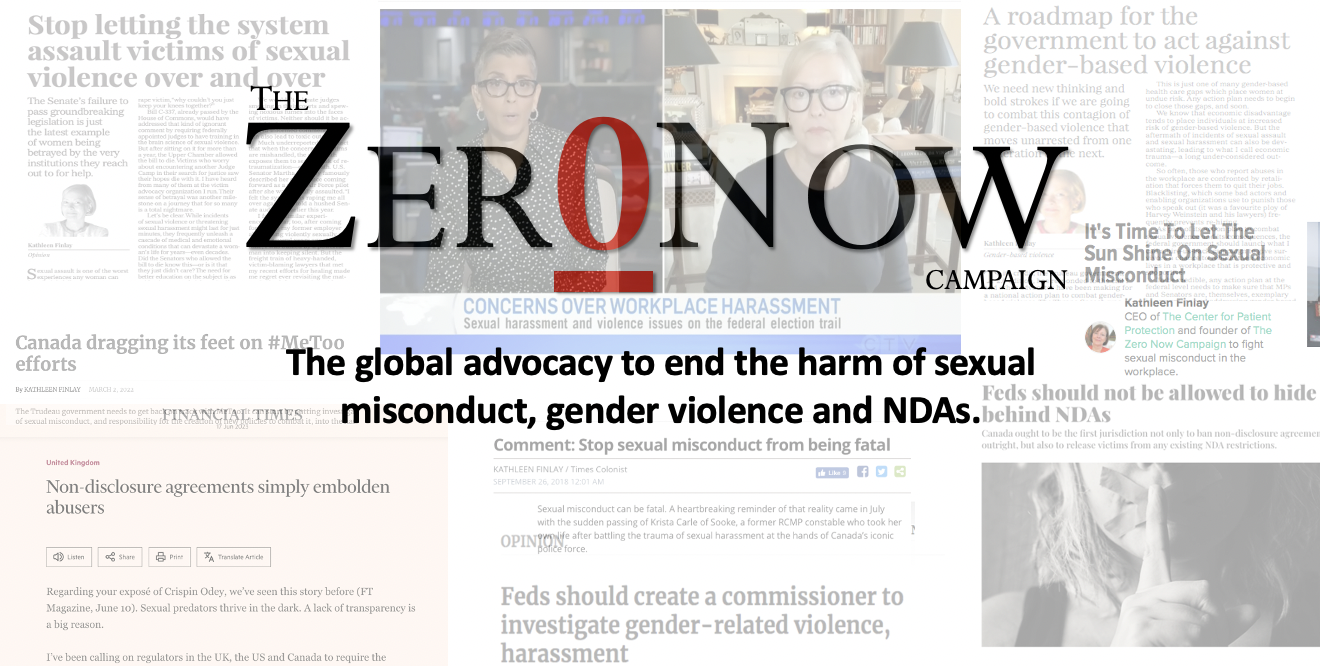By Kathleen Finlay
Among our largest employers, governments must set the right tone — a zero-tolerance tone — for sexual misconduct.
We’ve seen an almost endless procession of headlines chronicling the downfall of luminaries over allegations of sexual misconduct. Actors, producers, broadcasters, comedians and even chefs have all walked into this ginormous propeller of public outrage.
Then there are the high-profile politicians in the U.S. Congress. Closer to home, and in the span of 24 hours, Ontario PC leader Patrick Brown, Nova Scotia Conservative leader Jamie Baillie and federal Liberal cabinet minister Kent Hehr all abruptly resigned following allegations of improper behaviour.
As scandals on Parliament Hill reveal, our public institutions could be among the biggest offenders.
But when it comes to sexual misconduct, we haven’t even begun to tally what goes on in the everyday workplace, where millions of women face this epidemic without the benefit of cameras or reporters to witness the damage.
Want to really change this picture? Start here: since governments set the rules for the rest of the workplace and are among our largest employers, they should take the lead in setting the right tone — a zero-tolerance tone — for sexual misconduct. But as scandals on Parliament Hill (not to mention in the RCMP and Canadian military) reveal, our public institutions could be among the biggest offenders.
I left, my harasser stayed
I’ve seen that movie.
It began when I was sexually assaulted by a prominent government official(never investigated) at a conference of Canadian securities regulators. It ended with the destruction of my 20-year career after I complained about sexual harassment on the part of my boss (also never investigated) at the government agency where I worked.
Leaving a job is not the end of the sexual misconduct nightmare. It’s only the beginning.
What happened next is what occurs in too many cases where the media are not there to shine their big spotlight: I left. My harasser stayed.
Here’s something else I didn’t know: leaving a job is not the end of the sexual misconduct nightmare. It’s only the beginning. Every opportunity I pursued for employment in my areas of expertise — or anywhere in the government for that matter — led to a dead end.
I had an excellent CV and a stellar educational background; still, I couldn’t even get an interview for advertised government positions I held straight out of university two decades earlier. On the other hand, a number of private-sector interviews went so well that I was frequently asked “How soon can you start?” But when they went back to my former employer for references, as every prospective employer does, I never heard from them again, and my calls and emails were left unreturned.
The reprisal writing was clearly on the job-search wall. My repeated pleas to the highest level of the government to end this ongoing retaliation were met with silence. So much for government setting the example.
Women often encounter retaliation when they stand up against sexual misconduct. It can be career-ending. That’s a big reason why so many, especially those in low-skill, low-wage jobs who live from paycheque to paycheque, are hostage to abusive bosses and are too afraid to speak out. Unfortunately, lawmakers don’t want to turn retaliation into a criminal matter, as I have long advocated. That could make a big difference in curbing reprisals.
Women deserve better
Over the years, I’ve heard from hundreds of women — many from the public sector — who wanted to share their stories. Every one of them told me that if they had known about the personal pain and financial costs of pursuing a complaint, they would not have spoken out. Most were never able to resume their chosen careers and recount shocking stories about vindictive bosses and employers. Financial problems were common. Many suffered disabling health issues and some even considered suicide.
Society can’t afford to see so many talented women frozen out of the workplace.
Here’s part of an action plan for governments developed by The Zero Now Campaign, the advocacy group I founded, that will make a difference in the real-world workplace. The private sector is more than welcome to join in.
Make governments at all levels disclose sexual misconduct statistics
It’s said that humans, like subatomic particles, behave differently when they’re being watched. But when it comes to dealing with sexual misconduct in the workplace, there is absolutely no transparency. Right now, we have no idea how many women have filed complaints, for example, in the RCMP, on Parliament Hill or at Queen’s Park.
It’s time for a sunshine law requiring every public law-making and legislative body, as well as all taxpayer-funded departments, boards, commissions, agencies, universities and hospitals to publish annual statistics on the number of incidents reported to them, the outcome of each complaint and any financial settlement paid.
It’s time for a high-profile campaign by our best employers, especially public sector employers, to hire the survivors.
End non-disclosure agreements (NDAs)
Women who report sexual misconduct often find themselves forced to sign an NDA at various stages of an investigation. These legal devices amount to a gag order that protects offenders and preserves the reputation of their frequently enabling organizations.
They allow too many employers to hide behind a cloak of invisibility and treat sexual misconduct as just another cost of doing business. They make it impossible for women to speak out and protect other women, or to explain to a prospective employer why job references have been tainted.
Hire survivors of sexual misconduct
Despite what you read about the recent downfall of figures like broadcasting legend Charlie Rose and former U.S. Senator Al Franken, in typical cases it is the victim of sexual harassment who winds up leaving the organization. As I have been advocating for the past several years, it’s time for a high-profile campaign by our best employers, especially public sector employers, to hire the survivors whose lives and careers have been shattered because of sexual misconduct. I call it Hire Us Back.
If this is really a period of reckoning, we’ll need more than shocking headlines and glamorous black-dress galas. We need change that can really be seen and felt among the forgotten women in the everyday workplace.
Published in The Huffington Post February 9, 2018

